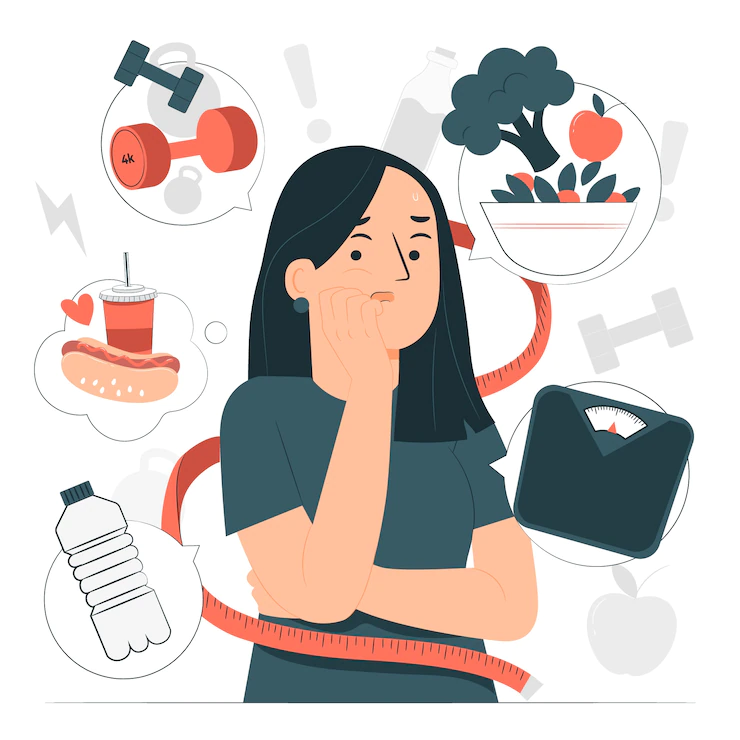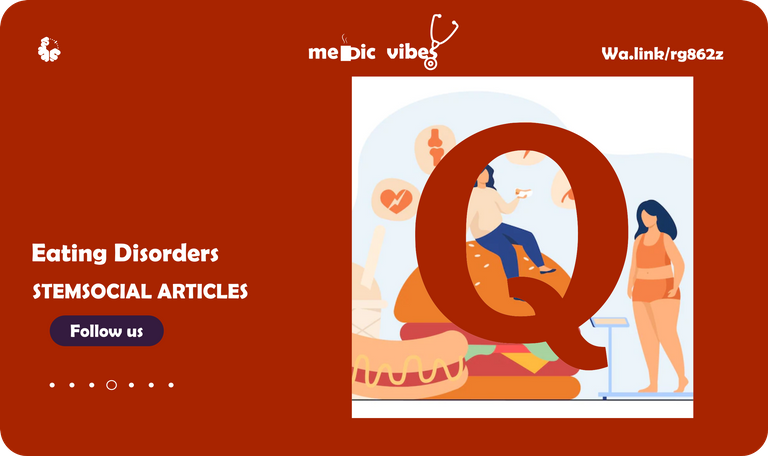What are misconceptions about people with eating disorders?
In the last post, we saw how:
- There are biological psychological and social factors responsible for eating disorders.
- Resolving eating disorders it will require effort from a team of therapists, dieticians and the family.
- The treatment for anorexia still needs more studies to drive treatment as many still see it as untreatable.
Do people with eating disorders know they have eating disorders?
Welcome to Medic Vibes, where we discuss mental health disorders and make sense of them. Dr Ebingo Kigigha is a medical doctor (aspiring psychiatrist) and creative person (illustration and music). This has been our routine for four consecutive months. This month will be dedicated to Eating Disorders. In the first month, we discussed Depression, and in the subsequent month, anxiety. We just finished with Schizophrenia.
In this post, we are looking at Quora. To learn more just keep scrolling down. You can also skip to the key point of the post if you which or go to the conclusion to get the summary.

Studies done over different years show the incidence and prevalence of eating disorders. The problem with these studies is the methods applied to them. Those who have eating disorders tend to hide their symptoms in addition to making up a small portion of the population. Because of this studies done are very expensive and oftentimes do not have the required effect.
Many of the studies make use of hospital data and the iceberg phenomenon makes the unreported case go unnoticed.
There are also fluctuations in the number of cases as time goes by and people become aware and in so doing the actual incidence is not known.
What is known right now is that women are more affected than men by anorexia and girls between the ages of 15 to 19 tend to be more affected and the rates seem to be increasing. Nobody is sure if this is due to earlier detection. Bulimia’s incidence appears to have reduced since the mid-1900. The risk of mortality has also increased especially that of anorexia. Binge eating disorders appear to be more common in males when compared to other eating disorders.

Misconceptions in Eating Disorders(Reaction post)

Amy Smith, explains that those who do not understand much about eating disorders tend to think that those who suffer from this condition are ONLY skinny girls.
She explains that she deals with phobia anxiety disorders such as agoraphobia and emetophobia among other phobias. She also has an eating disorder that makes her skip meals during the day and eat just at night. After that, she explains that she had episodes of vomiting daily. What she described is a binge and purge disorder.
A good number of people think that eating disorders affect just thin teenage girls but it has been found to affect other demographics.
According to the National eating disorder, even professionals find eating disorders confusing even after treating them for years. For this reason, most do not take the medical diagnosis of eating disorders seriously.
One of the popular misconceptions is that those who have eating disorders are choosing their lifestyle. Eating disorders are part of a long list of psychiatric disorders and need to be handled with care or they could lead to loss of life or poor quality of life. There is enough evidence to show that there are biological components of this disorder that affect these patients. Other mental health conditions are also known to have eating disorders like anxiety, depression and obsessive-compulsive disorder.
Some people believe that everyone has some form of eating disorder or other because of the focus on diet and exercise. Even though the world is tending towards being more informed about these conditions, those who meet the diagnostic criteria for these conditions are not as common. Several studies have shown that the number of people who have eating disorders is less than 1% of the general population for eating disorders like anorexia and less than 4% for bulimia.
It is more important to end the stigma against eating disorders so those shows have these disorders will feel safer receiving treatment.
Some parents believe that they are to blame for their child’s eating disorder. There is a tendency for parents to take up the blame for their child’s eating disorder because of the initial thoughts by professionals that eating disorders are a result of parental neglect but new data on the subject shows that biology is more likely the cause of these problems and it has nothing to do with parenting.
More emphasis should be made on parents playing an active role in the child’s recovery.
Some people tend to play off eating disorders as just a minor problem but what studies show is that anorexia has the highest death rate among mental health disorders. Some other studies have found similarities in other eating disorders like bulimia. There are also other complications of eating disorders like vomiting and purging that can greatly limit the quality of life enjoyed by those who have eating disorders.
Some think that they will be able to see those who have eating disorders engaging in the habit these disorders are known for but many of them who have these habits do so in secrete. Sometimes when a person is diagnosed with this condition their friends and family find it hard to believe because of how good they are at hiding it.
The best response to finding out is empathy and a will to do what is best for them. Your loved one will need to encourage you to find help. Find a way to show how bothered you are about the judgement issue.

Treatment
A meta-analysis done by Jasmijn de Vos of PubMed tried to review important literature on Anorexia pharmacotherapy. In the article, they tried to compare the different drugs used in Anorexia Nervosa such as antidepressants, antipsychotics and hormonal therapy to placebo.
They took a search through trial studies that looked into how effective pharmacotherapy is from the other three studies. About 32 other interventional studies that were analysed were also looked at.
The results showed that there was no significant difference between the antidepressant and the placebo or the antipsychotics and the placebo. The reason for this was partly the because of the small size of the study. For hormonal treatment, the results showed improvement in weight. There was no evidence of any bias in the studies analyzed.
The study confirmed that the effect of hormonal therapy was more profound in anorexia than placebo but the result has to deal with caution because of the wide range of variability. It also brought light to the fact that more studies need to be done to show the effects of antidepressants and antipsychotics on weight in these patients because the sample size was simply too small to reveal this data.
Questions
- What did you learn about Eating Disorders?
Conclusion
- Eating disorders tend to happen more in women than in men.
- There are many misconceptions about eating disorders that affect its treatment in general.
- Hormone therapy is more effective in gaining weight in anorexia according to metanalysis reviewed.

References
- Kaplan-Sadocks-Comprehensive-Textbook-Psychiatry
- Page demarcations made with Inkscape.org
- Eating Disorder Hope


thank you very much for this wonderful article on eating disorder. Your articles are truly an eye opener for most of us. Thank you
You are welcome. Thank you for stopping by!!
You're welcome
Thanks for your contribution to the STEMsocial community. Feel free to join us on discord to get to know the rest of us!
Please consider delegating to the @stemsocial account (85% of the curation rewards are returned).
You may also include @stemsocial as a beneficiary of the rewards of this post to get a stronger support.